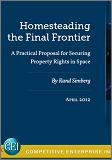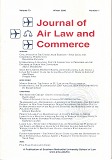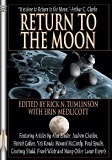FAQ #27: What were the assumptions before the Outer Space Treaty, (e.g. Robert Heinlein)?
Before the passage of the Outer Space treaty, it was always assumed, and almost common knowledge, that the people who first settled on the Moon would own it.
For example, in Robert Heinleinís 1961 science fiction classic "Stranger in a Strange Land", the Federation High Court rules that the Moon is owned by a group of men who were sent, on the second ship to land there, by a private, American-controlled Swiss corporation, launched from an island leased from Ecuador.
Heinleinís court ruled that although another ship, sent by the U.S. and Canada, had been to the Moon first it hadn't left anyone behind, and so "the real owners were the flesh-and-blood men who had maintained the occupation - Larkin and associates. So they recognized them as a sovereign nation and took them into the Federation."
Note Heinlein's court ruled the settlers owned the entire Moon, not just a small portion of it as in the proposed Space Settlement Prize Act.

Questions & Answers about Lunar Land Claims Recognition
Note: The first 25 FAQs below are reprinted from the Space Settlement Initiative ![]() website.
website.
What is the real purpose of enacting a Lunar land claims recognition law?
What does international law say about private property ownership in space?
Can there be property ownership without national sovereignty?
What if other nations refuse to recognize land claims in space?
Why not allow smaller, limited land claims for easier steps than settlement?
Could lunar land really be worth enough money to make a difference?
What conditions should the US set for recognition of a claim?
How much land should a settlement be able to claim... and why?
Are the weaknesses and compromises in this plan likely to be permanent?
Could other sources of revenue be enough without land claims recognition?
What effect would this have on NASA and the aerospace companies?
More FAQs
The FAQs above cover basic questions about Lunar Land Claims Recognition. The following questions address more advanced issues.
If we really went to the Moon in 1969, why aren't we there now?
What were the assumptions before the Outer Space Treaty, (e.g. Robert Heinlein)?
Will changing how NASA works bring the taxpayers back on board?
Could this law force the US to recognize a foreign government's Lunar land claim?
Would Article VI of the Outer Space Treaty prohibit Lunar land claims recognition?
| Back from What were the assumptions (e.g. Heinlein) to Frequently Asked Questions (FAQs) Back from What were the assumptions (e.g. Heinlein) to the Space Settlement Institute home page |




